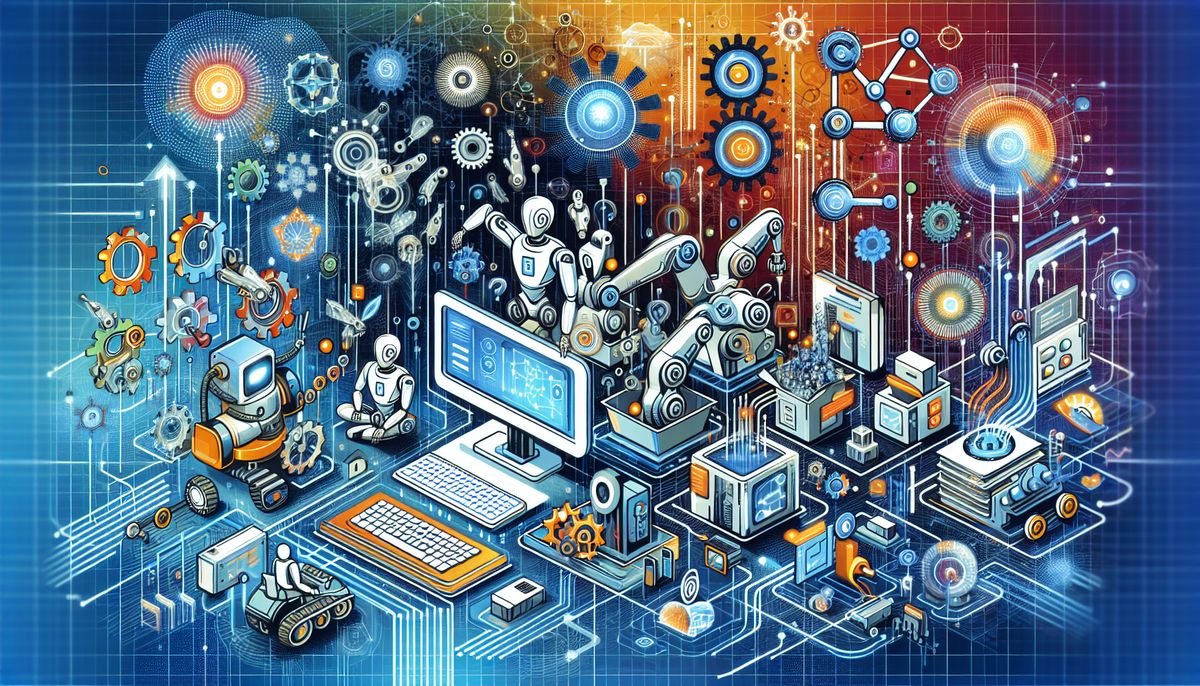In the rapidly evolving landscape of technology, Artificial Intelligence (AI) stands as a beacon of innovation, offering transformative solutions that redefine the way businesses operate. This comprehensive guide aims to unravel the mysteries of AI and its myriad applications, from optimizing supply chains and revolutionizing customer service to enhancing data security. As we delve into the latest AI automation software, we uncover how these tools not only streamline operations but also provide a strategic advantage in an increasingly digital marketplace.
Key Takeaways
- AI development services are pivotal in enhancing business operations, offering predictive analytics for supply chain management, AI chatbots for customer service, and advanced protocols for data security.
- Businesses must navigate challenges such as implementation hurdles and ethical considerations while preparing for an AI-driven future with emerging trends in AI technology.
- Adopting AI tools like AI website builders and analytics tools can lead to increased accuracy, innovation, and scalability, ensuring businesses stay competitive and adaptable.
Harnessing AI for Enhanced Business Operations
Optimizing Supply Chain Management with Predictive Analytics
The integration of predictive analytics in supply chain management has become a cornerstone for enterprises seeking to enhance efficiency and responsiveness. By applying advanced forecasting techniques, businesses are now able to anticipate and navigate the complexities of supply chain dynamics with greater precision.
Predictive analytics in supply chain management is not just about forecasting demand; it’s a comprehensive approach that encompasses inventory planning, production scheduling, and distribution strategies to ensure a lean and responsive operation.
One of the most significant applications of AI in this domain is the ability to predict various aspects of supply chain management, which has been particularly relevant in the past few months. For instance, AI-driven tools are now capable of analyzing historical data to forecast customer behavior, identify potential market opportunities, and solve problems preemptively.
- Forecasting demand to adjust production and inventory levels
- Optimizing delivery routes to reduce transportation costs and time
- Managing inventory to minimize holding costs and maximize availability
These capabilities not only drive improvements in every aspect of operations but also provide a competitive edge in today’s fast-paced market environment.
Revolutionizing Customer Service through AI Chatbots
The integration of AI chatbots into customer service roles has marked a significant shift in how businesses interact with their customers. AI chatbots are not just a trend; they are becoming a necessity for companies that aim to provide round-the-clock service and instant responses to customer inquiries. Recent developments have seen chatbots becoming more sophisticated, capable of handling a variety of tasks that were once the sole domain of human agents.
One of the key benefits of AI chatbots is their ability to automate routine tasks. For instance, they can manage simple customer queries such as tracking orders, providing product information, or even taking food orders and reservations. This automation leads to a more streamlined customer service experience and allows human representatives to focus on more complex issues.
The rise of AI chatbots has led to a transformation in customer service, with a focus on efficiency and personalization.
The following list highlights some of the recent applications of AI chatbots in customer service:
- Automatic reservations and food orders
- Personalized product recommendations
- Real-time customer support and inquiry handling
- Integration with omnichannel platforms for seamless customer interaction
As businesses continue to adopt AI chatbots, it’s crucial to understand the best practices and successful case studies. Resources like "Top 24 Chatbot Case Studies & Success Stories in 2024" and "AI Chatbot for Customer Service: How To Do It Right With 10 Examples" provide valuable insights into effective chatbot strategies and their impact on customer satisfaction.
Strengthening Data Security with Intelligent AI Protocols
In the realm of data security, AI-driven cyber threats require SaaS data protection. The implementation of AI in security protocols is not just about defense against external cyberattacks but also about safeguarding against internal threats that can compromise data integrity and reliability. AI’s ability to identify malware, fraud, and network anomalies is becoming increasingly sophisticated, offering a proactive approach to cybersecurity. This not only protects sensitive business and customer data but also reinforces trust and compliance with regulatory standards.
The most crucial role of artificial intelligence in enhancing data security arises from its ability to identify and respond to security incidents faster than humanly possible.
With AI often relying on large sets of personal data, privacy and data security concerns are paramount. Businesses must adhere to data protection regulations and ensure that AI systems are secure against breaches. Ethical customer data handling and transparent communication about how AI uses this data are crucial in maintaining customer trust.
- AI systems monitor network traffic for unusual patterns.
- AI detects potential threats.
- AI responds to security incidents rapidly.
- AI ensures compliance with regulatory standards.
Navigating the Challenges and Future of AI Integration
Addressing Implementation Hurdles in AI Adoption
The adoption of AI within enterprises is not without its challenges, particularly when it comes to the technical and operational aspects. Implementing AI requires specific technical expertise and infrastructure, which can be a significant hurdle for some businesses. Seamless integration with existing systems is crucial, yet often complex, and the upfront costs can be substantial. These costs are not just financial but also involve investments in training and potential disruptions during the transition period.
Quality data is the cornerstone of effective AI systems. AI’s effectiveness is directly tied to the data it’s trained on, and subpar data can lead to inaccurate and unreliable outputs. This necessitates a robust data governance framework to ensure data integrity.
The workforce implications of AI are equally important. The introduction of AI can lead to job displacement concerns, making it imperative for businesses to manage this transition thoughtfully. Upskilling employees and redefining roles to work alongside AI are critical steps in this process. Moreover, ensuring that the workforce understands and accepts AI tools requires comprehensive training and change management strategies.
While AI integration poses significant challenges, it also offers transformative potential for businesses willing to navigate these hurdles. By addressing these issues head-on, enterprises can harness AI to drive innovation and efficiency.
Ethical Considerations in the Age of Autonomous AI
As enterprises embrace AI automation, the ethical landscape becomes increasingly complex. Organizations must establish clear ethical guidelines and frameworks to govern the development and deployment of AI automation. Transparency in AI processes is not just a regulatory expectation but a cornerstone of customer trust.
One of the most pressing ethical issues is the potential for AI to perpetuate biases present in training data. To combat this, businesses are focusing on ethical, transparent, and accountable AI systems. It’s crucial to actively identify and mitigate these biases to ensure fairness in AI decision-making.
Privacy and data security are also at the forefront of ethical considerations. With AI relying on large sets of personal data, adherence to data protection regulations is mandatory. Ethical handling of customer data and transparent communication about AI’s use of this data are essential in maintaining trust.
Furthermore, the integration of AI in the workplace raises questions about job displacement and the need for upskilling employees. Companies must manage this transition thoughtfully, ensuring that the workforce is prepared to work alongside AI through adequate training and change management.
Emerging AI Trends and Preparing for an AI-Driven Future
As we recap the advancements in AI for 2023, it’s clear that generative models have become a pivotal force in the landscape of artificial intelligence. These models, which can generate text, images, and even code, have transitioned from academic curiosity to powerful business tools, offering unprecedented capabilities in content creation and automation.
The integration of AI across various business functions has seen a significant uptick, with predictive analytics playing a crucial role in decision-making and strategy. This integration is not just limited to customer service or supply chain management; it’s reshaping HR processes, market analysis, and even strategic business planning.
For businesses, adapting to an AI-driven future means embracing continuous learning and technological innovation, while also fostering a culture of ethical responsibility.
The robots are indeed coming, and they’re here to redefine business models and strategies. As we prepare for what’s to come, it’s essential to understand the tools shaping the future of work and how they will impact competition and business growth.
Embracing the AI-Driven Future
As we conclude this comprehensive guide, it’s evident that the transformative power of AI is not just a promise for the future, but a reality reshaping the business landscape today. From optimizing supply chain management to enhancing customer service and bolstering data security, AI’s applications are vast and varied. The key takeaways from our exploration underscore the importance of enhanced accuracy, innovation, scalability, and strategic decision-making in maintaining a competitive edge. Businesses that adapt to these AI-driven solutions will not only streamline their operations but also position themselves to thrive in an increasingly digital and data-centric world. The journey towards AI integration may pose challenges, but the potential rewards for those who navigate it successfully are substantial. It’s time to embrace the future and leverage AI to unlock new horizons of efficiency and growth for your enterprise.
Frequently Asked Questions
What are some of the latest AI tools that can transform enterprise operations?
Some of the latest AI tools include predictive analytics for supply chain management, AI-driven cybersecurity protocols, and advanced analytics tools for market analysis. These tools can significantly enhance operational efficiency, data security, and strategic decision-making.
How can AI chatbots revolutionize customer service in businesses?
AI chatbots can provide 24/7 customer support, handle multiple queries simultaneously, and offer personalized experiences based on customer data. They can significantly reduce response times and improve overall customer satisfaction.
What are the ethical considerations businesses must keep in mind when adopting AI?
When adopting AI, businesses must consider issues such as data privacy, algorithmic bias, and the potential impact on employment. It is crucial to implement AI responsibly, ensuring transparency, accountability, and fairness in AI systems.



